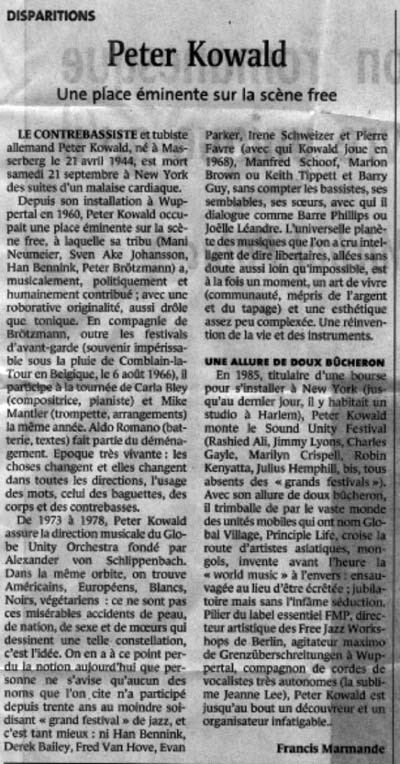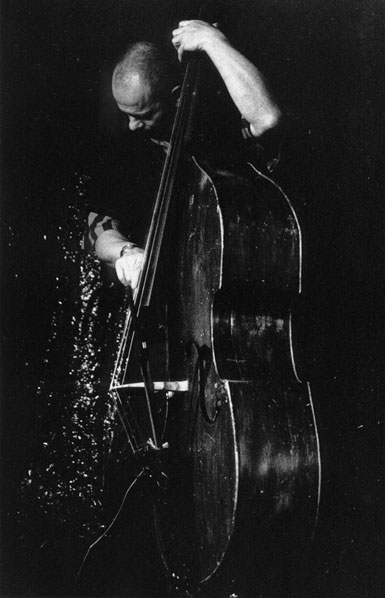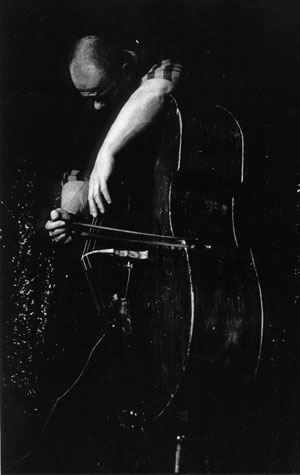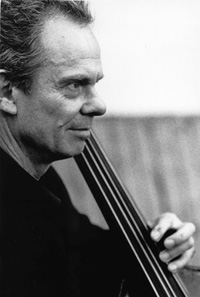- Farewell to a visionary by Ralf Dombrowski  see below see below
- Peter Kowald, une place éminente sur la scène Free - de Françis Marmande 
----------------------------------------------------
Farewell to a visionary
by Ralf Dombrowski
Peter Kowald
They were wild times. At the beginning of the sixties young musicians made a frantic grab for their instruments and coaxed sounds from them hitherto unheard. In a mixture of social rebellion and artistic need for renewal, they smashed the acoustic standards that so far had shaped the world of sounds. Traditional harmony, melody, rhythm were regarded as old-fashioned, uncool and obsolete. Against this they set individuality carried to an extreme as the liberation of expression from the corset of form, from the straitjacket of the norm. Those actively involved saw this rebellion against the rules and regulations of the modern age as a necessary one. It enabled them to put into perspective the Afro-American monopoly on improvised music in favour of international, primarily European and African developments. The audience, however, sometimes had no end of trouble with this. Because the reverse side of the individual-personality coin was a complicated encryption of the language of sound, which from then on was understood only by a few specialists. The "Free Jazz" label, which the musicians understood as a positive key concept of a new creative consciousness, turned into the concept of the enemy on the part of the audience and engendered a latent fear of the unfamiliar unbridled eruptions of sound on stage and audio carriers. Often the listeners did not see liberty as an opportunity for, but as a threat to, the aesthetic equilibrium.
It was because of musicians like Peter Kowald that a discursive dialogue evolved from these misunderstandings and secret fears on the one side and artistic visions on the other. With a combination of curiosity and respect, he not only mediated between the different attitudes but, through his art and personality, he played a major part in the Euro-American jazz industry.
Kowald was born on April 21st, 1944 in Masserberg, Thuringia and grew up into the Wuppertal circle of iconoclasts who had gathered around the saxophone player Peter Brötzmann. Even after the would-be revolutionary phase of the free-thinking sixties, he decided to continue the experiments of his youth. He developed his own techniques of sound formation on the double-bass and was one of those who re-discovered the bow, which had gone out of fashion with the fast tempi of Bebop. Kowald worked together with like-minded people from the international scene and after his early beginnings in the Globe Unity Orchestra, which he had co-founded, played in new ensembles both large and small like the Reform Art Unit or the London Jazz Composers Orchestra.
And he was above all interested in stringently augmenting his experience with the formal openness that he had gathered from Free Jazz. For him, freedom did not mean anarchy, but the spontaneous creation of structures. He spoke of the "humanisation of technique", which meant tracing back the creative process to human forms of communication, to a complex, but experiential, language of sound. The boundary lines between this and contemporary improvised music and also ethnic structural patterns were fluid. Kowald sometimes collaborated with illustrious figures from the experimental scene, such as Anthony Braxton, Evan Parker or Han Bennink; at other times he could be heard with the Mongolian singer Sainkho Namtchylak or even in unaccompanied solo concerts. Tours took him from New York via Japan to Siberia and his striking expressiveness has been documented on more than 70 recordings in the course of the years. Kowald deliberately crossed the boundaries to neighbouring arts. Dance projects brought him together with the eminent authorities of that scene, like Pina Bausch, Kazuo Ohno and Jean Sasportes. Artists such as, for example, Nam June Paik invited him to work with them. The impetuous bass player of the avant-garde years became an ambassador of contemplative musical modernity.
It was only logical therefore that in 1996 Peter Kowald was awarded the Albert Mangelsdorff Prize created by the GEMA Foundation together with the Union of German Jazz Musicians for his special services to the music culture of the 20th century. In the speech he gave on this occasion, he said: "I actually never dared to play jazz. Just as I never dared to play flamenco music or Greek rembetiko or any other music of this world. Because as [the drummer] Rashied Ali once said, I did not grow up with it. I have always had scruples, a kind of reticence, about what comes from others; and the wish to learn this with such sophistication and exactness that one can identify with it even at a deeper level; and at the same time there was this opening-up in the sixties where the aim was to depart from traditional (and thus in principle local) forms. For us, the proportion of the free in Free Jazz primarily meant being able to work without stipulated forms, similar to painters and sculptors or, if you like, poets. And it also meant being able to incorporate any music at all that exists in the world, which we now able to hear and know so much about, via a kind of filter, the filter of distance. Not a distance of the kind that means we are not prepared to get involved, by placing ourselves at a distance above it, but out of a respect for it, the respect that finally does not permit imitation because we did not grow up with something, because we cannot really live something. [...] Perhaps it is most correct to say that I have become a traveller. It is a wonderful privilege to have a reason to be somewhere else, to work with artists there via this open form where, to start with, everything is allowed, nothing prohibited. But this does not mean that we then do not have to fill it with commitment, with warmth, with our personal regard, however this may be formulated." The words of an idealist and visionary who succeeded in achieving so much in his life.
On 21st September 2002 Peter Kowald died unexpectedly in New York of heart failure. Only a few hours earlier he had given a concert.
-------------------------------------------- tothetop

------------------------------------------- tothetop |





